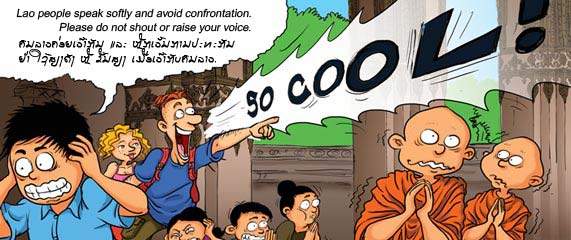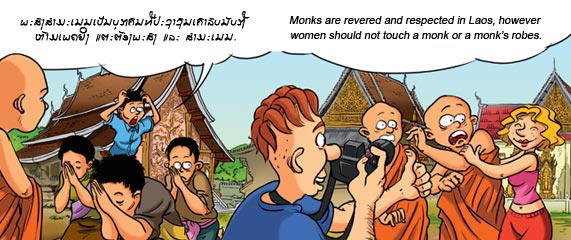Do’s and Don’ts in Lao Culture
If you’re new to Laos it probably didn’t take you long to realise that Lao culture is very different to western cultures. It can often be confusing and seemingly illogical if you’re not too clear on the reasoning. To try and help you navigate the complexities of Lao culture we’ve put together this handy list of Do’s and Don’ts to help make sure you can get on with the local community.
DON’T touch people’s head. The head is considered sacred and touching people on the head is very impolite
DO avoid confrontation. Lao people believe in ‘saving face’ and a direct confrontation will cause them to lose face. In a business setting, do not look to attribute blame for a mistake, but instead look for how ‘we’ can avoid similar issues in the future.
DON’T single people out for their mistakes, especially in a business setting. Not only is this considered rude and inappropriate but it will make them sullen and likely lead to more mistakes. Find a way to address the issue while looking for a collaborative solution.
DO take off your shoes before entering a home and some businesses. If you see a shoe rack beside the front door that’s your sign that this is a shoe free area.
DON’T keep your shoes on inside a house or temple. It’s very rude and disrespectful to your host.
DON’T use your feet to point at people or objects. If you are sitting on the floor, try to keep cross legged and avoid pointing your feet towards people.

DO return a ‘nop’ (the traditional Lao greeting of two hands clasped together in front of the chest in a praying position, combined with a short bow) if you receive one.
DON’T give a nop to every Lao person you see. Just as you wouldn’t walk down a street in your home country waving or shaking hands with everyone you come across, you don’t need to nop at every Lao person.
DO make an effort with your appearance. Lao people appreciate people who are wearing neat, clean clothes. This is especially important if visiting temples or government offices.
DON’T wear anything too revealing in public. Traditionally Lao would keep their shoulders and knees covered. While this is changing with more exposure to Western media, a conservative dress code is still appreciated in temples, government offices and rural areas.
DO try to follow the traffic rules, even if it appears that no one else is following them.
DON’T expect everyone else on the road to follow traffic rules, or even logic.
DO be prepared to barter with police officers if stopped for a perceived breach of the traffic rules.
DON’T try to point out other people doing the same thing. It won’t get you anywhere.

DON’T buy disarmed UXOs that have been found in the countryside. It creates a market for these dangerous products and encourages people to go out and look for them, at great risk to themselves and communities.
DO support NGOs working on UXO clearance and those dealing with the consequences of UXOs, such as COPE
DON’T support wildlife trafficking. If you see a wild animal in a market, don’t buy it to try and save it. This supports the market and shows poachers that westerners are interested in buying these animals.
DO report wildlife trafficking to the correct authorities. You can call the Lao Conservation Trust for Wildlife who can work with local authorities to rescue the animals without supporting the live animal trade.
DO set a good example for how to deal with trash and always place your litter in the bin. If there is no bin available, take your trash with you.
DON’T throw your trash on the ground, even if you see other people doing it.
DO be respectful of monks and the role they play in Lao society.
DON’T touch monks, especially if you are a woman.

DON’T make public displays of affection, such as kissing and hugging in public. It is considered impolite and bad example for the Lao youth.
DO respect Lao culture and be discrete with your loved ones.
DO support local communities and try the local food. This supports local farmers and businesses as well as giving you a chance to experience more of the Lao culture.
DON’T turn up your nose at sharing dishes, especially sticky rice. Lao traditionally eat in groups and share meals and dishes. If you are having a meal with colleagues or Lao friends, enjoy the experience of sharing dishes.
DO try to learn at least some of the local language. Not only will this help you in your day to day life, it is also a show of respect for the Lao culture that locals will greatly appreciate.
DON’T get frustrated if locals can’t understand you. Try a different approach, different words, or even some sign language. Online translators can help to a limited degree but are more useful for finding a key word.
DON’T feel the need to tip in every restaurant. If the service is good you can do it but its not expected. In some instances it can even be considered condescending. For example a small noodle soup stall probably doesn’t warrant a tip, but an expensive meal in an upmarket restaurant with great service it would be more expected.
DON’T underestimate the power of Beer Lao as a negotiation tactic. If you are having a dispute with your neighbour then bringing round a case of Beer Lao to ease the discussion is going to make things go a lot smoother.
DO make sure you have appropriate insurance. Laos can be an expensive place to have an accident so you want to make sure that you have an appropriate level of cover. J&C Insurance is an award winning and leading independent insurance specialist in Laos offering customer-tailored solutions. We cover Health, Travel, Motor, Office, Home & Content, Public Liability, Life & Personal Accident and many more!
J&C have been trusted by the expat community for 12 years and has established itself as a leading provider.
That’s our brief introduction to Lao culture! We hope this helps you understand Lao a little bit more and navigate the cultural differences. If you feel like we missed something, then please let us know in the comments!
by David Ormsby, copyright J&C Services 07/2020

